
In this article, we deal with some of the most common diseases that can affect a dog. We are talking about gastrointestinal diseases, and how they can be resolved through nutrition.
Since we are talking about the digestive system, whose purpose in the organism is precise to assimilate the nutrients that are ingested, it would seem clear to most owners how nutrition plays an important role in the resolution of these pathologies.
In reality, however, this is not the case: I have noticed that many owners see the change in the feed (this is due to the marketing of feed) as a kind of magic wand that solves all problems, especially gastrointestinal problems.
However things are not exactly like this: although nutrition is a very important component for the resolution of these problems, we must always remember that we are talking about a sick organ, with problems of various types: as when the functioning of the heart is altered, of the lungs or kidneys, nutrition supports but does not resolve.
The resolution can be medical (drugs) or surgical, and the intervention of the veterinary doctor is always necessary to make the pathologies disappear. The cases in which the solution can only be a change of power are rare.
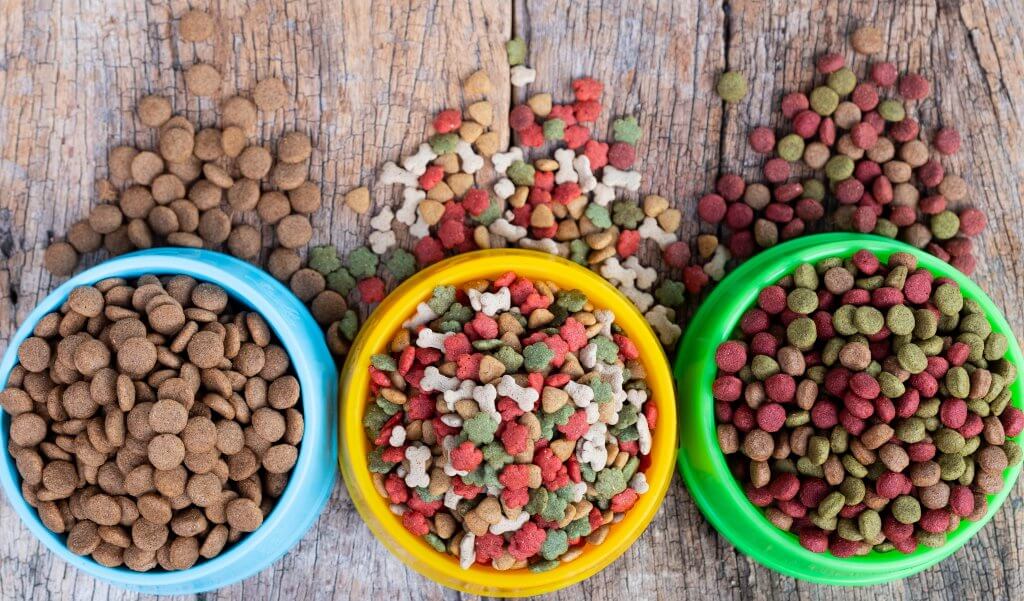
The dog’s digestive system
First of all, let’s try to make a quick excursus on what is the structure of a dog’s digestive system, which is very similar to ours but with significant differences that are worth considering.
-
- The digestive system starts from the mouth. However, as we have already mentioned when talking about the dental health of the dog, chewing in this animal is almost non-existent and is not very important for digestion. Furthermore, the saliva has very little digestive activity while it has a mechanical function, that of making the food slide better in the digestive tract.
- After a long passage tube which is the oesophagus, the stomach is then found. Since the dog does not chew, the gastric acidity is much stronger than ours because in addition to the purpose of digesting proteins it also has that of penetrating inside the large bites that the dog eats. Also, the dog’s stomach is dilatable, able to accommodate very large quantities of food that will then be digested as it goes. That’s why he would eat continually if it were for him.
- The small intestine is very similar to ours and is a long tube used to absorb nutrients, in particular fats, proteins digested by the stomach and carbohydrates digested by pancreatic amylase. Pancreatic juices and bile are poured into the small intestine, which deprives the liver and is very abundant in the dog.
- The large intestine, on the other hand, is smaller than ours, and the caecum is practically non-existent, so the dog has virtually no possibility of digesting and absorbing the vegetable fibre. The function of the large intestine is essentially to absorb the water present in the intestinal cavity and to expel the waste material.
This system is what we have when the dog has a normal situation, so during his life. However, when alterations occur, the first problems begin, and unfortunately, these problems are very varied.
In this article, which is not a treatise on veterinary medical pathology, we will deal only with the most striking solutions and, above all, we will try to understand what are the bases of the nutrition of an animal with intestinal pathologies starting from the single components contained in the food, both in the industrial one as well as in the domestic supply.
The feeding of a dog during intestinal diseases
We always start from the assumption that all food pathologies of dogs lead to only one consequence: lack of nutrition. Diseases can affect the stomach, which for example could be inflamed and cause pain to the dog with its acids (gastritis), or the pancreas, which may not produce its juices, or the intestine that does not absorb substances.
In these cases, the first for a question of pain (ie vomiting, the expulsion of ingested material without absorption), the others for a maldigestion, the dog does not feed, and must, therefore, be fed to cope with the lack of nutrients he is suffering from.
We say that the approaches, according to the problem, are two.
-
- The first, more drastic, is putting the digestive system to rest, especially when there is a pain of some kind. In this case, the dog, which cannot remain without eating, is admitted to the veterinary clinic and is fed parenterally (which bypasses the digestive system), or with an IV.
- The second, more common, is based on giving foods that are easy to digest and to absorb by the dog, which despite being in a debilitating situation will have more nutrients available to assimilate a normal quantity. This is easier in cases of diarrhoea, maldigestion or malabsorption, but without pain.
Since the first solution is strictly medical, we will only deal with the second, which is materially carried out by the owner, even if advised by the veterinarian. This means that the bases must be known, and below we will analyze the individual food components that we can find in the feeds.
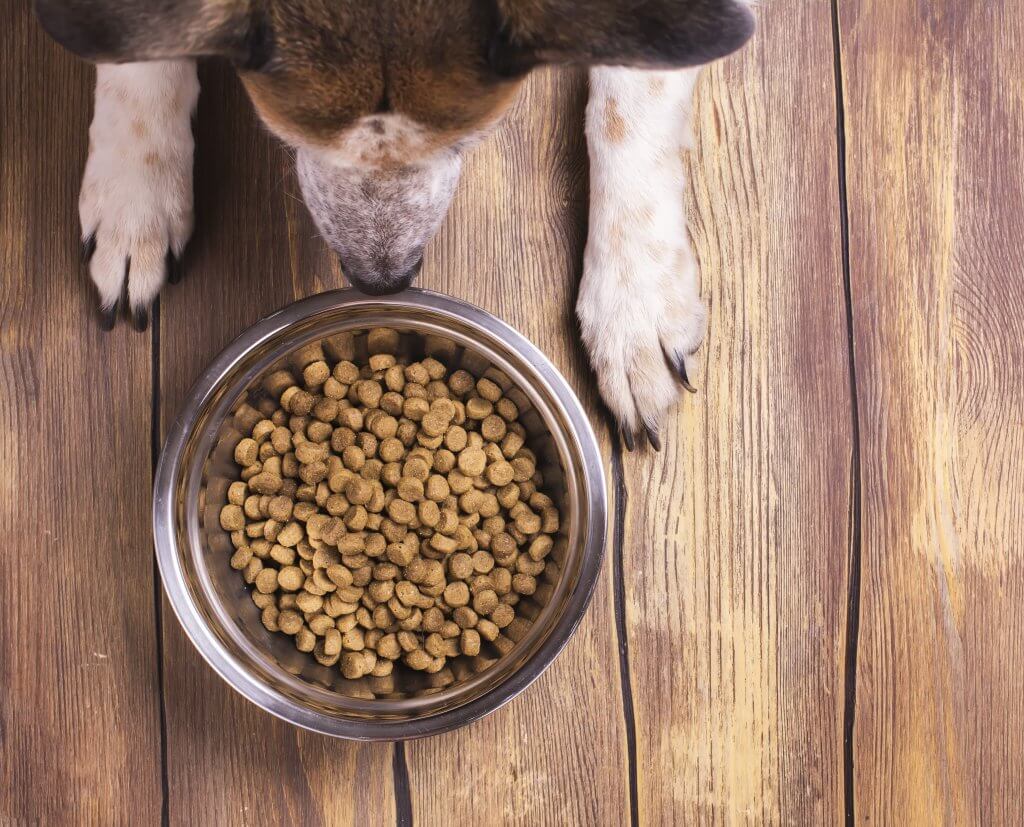
Water
Although it may seem trivial, water is essential during gastrointestinal diseases. Freshwater should always be available to a dog, even if it is fine, but in the course of this type of disease it is even more important, and if the dog does not want to drink it must be induced to do so, for example by bringing the bowl closer water.
Whether the dog has vomiting or diarrhoea, which are the most common symptoms of gastrointestinal problems, a large part of these substances are made up precisely of water, and this would lead the dog to have dehydration that could even be fatal, in the most serious cases.
If it is possible, water can be integrated through wet feeds that contain more than 34% of it, which is useful if the dog does not want to eat (perhaps because it has some pain) to supplement both the nutrients and the nutrients. ‘water.
Protein
Protein is one of the essential components in the dog’s ration, but in this case, where the dog has to regain its energy, it is not the fundamental component. Therefore, in the course of gastrointestinal diseases there is a tendency not to increase the protein content but simply to increase its quality.
In the course of gastrointestinal diseases, easily digestible proteins are given, such as those that come from the egg or from the milk, which is those with the highest biological value ever, and that fatigue the stomach less and are better absorbed by the intestine.
A logical thing: if we give hardly digestible proteins (collagen, like the boiled one) the stomach should produce more acid and this would increase the gastric inflammation, if present; moreover these proteins would have a longer intestinal transit, and it would be easier for them to end up expelled with diarrhoea, therefore not absorbed.
This is why the protein content should not be increased but simply improved, by offering easily digestible proteins.
Lipids
Lipids, or fats, are instead the most important part to be integrated during pathologies of the digestive system. If we consider that we have in front of a debilitated dog that does not absorb what it eats, we must give a ration as much as possible concentrated from the energy point of view to satisfy its needs.
This applies both to diseases that affect swallowing (in which the dog does not ingest much), and in the case of gastrointestinal diseases, because fat does not stimulate acid secretion. Thus the fats can easily reach the intestine where they will be absorbed and the dog will regain some energy.
However, there are cases in which lipids have to be almost eliminated, and they are those in which they create problems, as in the case of pancreatic diseases, in which fat worsens the situation. If the veterinarian says that the dog has problems with fat (and pancreatitis is a very serious problem) these components must be eliminated from the diet by favouring the integration of energy through carbohydrates, which are less concentrated but less harmful to the apparatus digestive system of the dog.
Carbohydrates
Carbohydrates, for a dog, are never simple components to digest, rather they are rather complex, and this goes badly with a digestive system that has problems doing its job. Not only: carbohydrates are a source of nutrition for intestinal bacteria, and this is a problem if the dog suffers from diarrhoea due to bacterial overgrowth.
This means that, except in cases where it is impossible to do otherwise as we have just seen (pancreatitis), it would be good to avoid providing the dog with a carbohydrate-based diet as an energy source, always preferring fats also to encourage the recovery of activities gastrointestinal.
In the case in which carbohydrates are supplied these must be made easily digestible with processes such as boiling (pasta, rice) or extrusion (for industrial feeds). Avoid bread, biscuits and everything dry because it would make the digestive activity more complex.
Fibre
In general, the fibre must remain in the normal quantity during gastrointestinal pathology, also because by increasing the intestinal motility there is the risk of worsening the situation if it is increased.
In some cases (when there is no diarrhoea) the balance will not change, while when there is diarrhoea, the less we give the better because, in addition to favouring the growth of intestinal bacteria, it would attract even more water into the intestine, worsening diarrhoea. “Less we give”, however, does not mean 0, because the fibre has action in the stimulation of bowel movement, and if there is no fibre at all this is likely to stop.n
In cases of constipation, however, the vegetable fibre must be given in quantity because it is essential to restart the bowel movement of which the dog is deficient, to dissolve the blockage in the intestine.
Minerals and vitamins
As for these types of nutrients, those necessary for the animal are already present in the food that it has, both industrial and home. This is because the salts are never lacking, even when it is healthy, but in the case of digestive tract disease, we try to favour the absorption of other substances that are more important for recovery and healing.
If blood tests show a deficiency, it will be the veterinarian who integrates these substances, while it is wrong to supply supplements on their own: these are protected by gelatin, because (especially for vitamins) they are not degraded by the stomach, to normal things. Putting gelatin, a difficulty digestible substance, in a weakened digestive system, would cause the exact opposite effect to what we are looking for, and this means that we would go to make the situation worse.
Therefore, if the vet says nothing about it, vitamins and salts will be absorbed more and more in step with the resumption of the absorption of the other substances. If there is a need for supplementation, he will put it through intravenous injection, so that the substances arrive immediately where they are most needed.
Best Dog Foods for Sensitive Stomach
Arion Health & Care Digestive Sensibility
12kg Veterinary diet for adult dogs with digestive problems of all breeds. Adult dogs with the sensitive and diseased digestive system. Arion Health & Care Digestive Sensibility is a feed specially developed to restore the balance of the digestive system. Careful selection of easily digestible proteins and carbohydrates helps stabilize the digestive system, and natural prebiotics and additional glucans optimize the intestinal flora and improve digestion. The benefits of Arion Health & Care Digestive Sensibility are Intestinal Health Support Improved digestion and healthy intestines: Carefully selected fibers (e.g., Psyllium seed hulls) in well-balanced proportions. Highly Bio-Available Omega-3 High content of omega-3: Antarctic krill, promotes good coat condition and skin health. The dog’s body extremely well absorbs Omega-3 fatty acids. Highly Digestible High bioavailability: Diet based on only high-quality ingredients. Intestinal Flora Improvement.
Improvement of intestinal flora: Mannooligosaccharides, fructooligosaccharides, bentonite, and beta-glucan – stimulate the growth of beneficial bacteria. They reduce the absorption of pathogens and other harmful substances through the intestinal walls. Ingredients: Rice, venison meal, animal fat, corn protein, chicken meal, salmon meal, chicken protein hydrolyzate, beet pulp, salmon protein hydrolyzate, dried Antarctic krill, sodium chloride, brewer’s yeast, Psyllium seeds.
Analysis: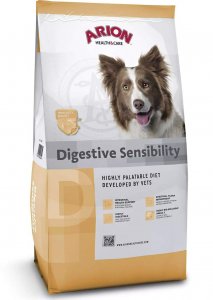
- Protein 25%
- Fat 15%
- Ash 7.1%
- Fiber 2%
- Calcium 1.4%
- Phosphorus 0.95%
- Omega-3 0.45%
Vitamins and microelements: Vitamin A 22,000 IU / kg, Vitamin D3 1,850 IU / kg, Vitamin E 200 mg / kg, Betacarotene 1 mg / kg, Iron 160 mg / kg, Zinc 180 mg / kg, Manganese 35 mg / kg, Copper 18 mg / kg, Iodine 1.5 mg / kg, Selenium 0.15 mg / kg.
Metabolic energy: 3,830 kcal / kg.
Dosage: Daily portion in grams: Adult dog weight (kg) Portion in grams (g / d)
-
- 2 – 5 kg 40 – 80 g
- 5 – 10 kg 80 – 110 g
- 10 – 20 kg 110 – 200 g
- 20 – 30 kg 200 – 280 g
- 30 – 40 kg 280 – 350 g
- 40 – 60 kg 350 – 450 g
- > 60 kg 450 – 600 g
EUKANUBA Daily Care
For adult dogs of all breeds who have digestive problems. Try EUKANUBA Daily Care Sensitive Digestion. The formula of this dry food contains beet pulp and additional FOS prebiotics to support digestive health and easily digestible rice suitable for dogs with sensitive stomachs. EUKANUBA Daily Care has been carefully developed with the participation of veterinarians to provide your dog with the best nutrition for long and healthy life.
THE MOST IMPORTANT BENEFITS:
-
- For dogs with sensitive stomachs and easily digestible rice
- Provides optimal digestion thanks to the prebiotic content (compared to Eukanuba for adult dogs of medium breeds)
- Supports natural immunity thanks to antioxidants whose positive effects have been clinically proven
- Clinically proven effective in maintaining lean muscle – thanks to the animal protein content
- Clinically proven effective in maintaining healthy skin and shiny coat, thanks to the appropriate content of omega-6 and omega-3 fatty acids
Ingredients: dried chicken and turkey (22%), rice (21%), corn, sorghum, animal fat, dried beet pulp (2.8%), fish meal, dried whole eggs, hydrolyzed animal proteins, fructooligosaccharides (0.77%), phosphate dicalcium chloride, potassium chloride, sodium chloride, sodium hexametaphosphate, fish oil, calcium carbonate, linseed
Analysis: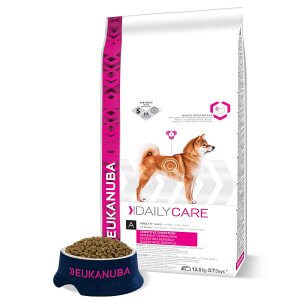
- Protein 23%
- Fat 13%
- Omega-6 fatty acids 2.3%
- Omega-3 fatty acids 0.33%
- Crude ash 6.8%
- Crude fiber 1.6%
- Calcium 1.2%
- Phosphorus 0.95%
Additives: Vitamins: Vitamin A: 46167IU / kg, Vitamin D₃: 1532IU / kg, Vitamin E: 256mg / kg, β-carotene: 5.0mg / kg.
Trace elements: Copper sulfate pentahydrate: 47mg / kg, Potassium iodide: 3.4mg / kg, Iron sulfate monohydrate: 633mg / kg, Manganese sulfate monohydrate: 48mg / kg, Zinc oxide: 220mg / kg, Manganese oxide: 34mg / kg
No added artificial colors. No added artificial flavoursDosage: Daily portion in grams: Adult dog weight (kg) Portion in grams (g / d)
-
- 5kg 80-90 g
- 10kg 130-145 g
- 20kg 205-230 g
- 30kg 270-300 g
- 40kg 330-365 g
- 60kg 430-480 g
HILL’S PD Prescription Diet Canine i/d Low Fat
Highly digestible, low-fat dog food that can be used to treat digestive tract disorders in the long term and reduces the risk of relapse. It has been clinically confirmed that it supports digestive tract convalescence. Hill’s Prescription Diet Canine i/d Low Fat is a high-digestible, low-fat dog food that can be used to treat gastrointestinal disorders in the long term and reduces the risk of relapse. It has been clinically confirmed that it supports digestive tract convalescence. Inadequate blood fat, an inability to digest protein, or a lack of digestive enzymes in the gastrointestinal tract can affect your dog’s health.
Hill’s Prescription Diet Canine is a clinically proven nutrition that supports the treatment of most of the most crucial animal health problems. Hill “s Prescription Diet foods are only recommended by a veterinarian. Additional information: The amount of energy in the feed is too low for growing puppies and bitches during pregnancy or lactation. In the case of acute pancreatitis, feed should be given after the first phase of therapy, in which the animal does not receive any food or liquid by mouth. Early start of feeding for a beneficial effect on the recovery process of the gastrointestinal tract.
Composition: Rice, corn starch, corn gluten meal, chicken meal, offal, barley, linseed, dried beet pulp, mineral ingredients, vegetable oil, powdered ginger root, vitamins, L-carnitine, L-lysine, trace elements, taurine , tryptophan. With natural preservatives and natural antioxidants.
Analysis:
-
- Protein 23.2%
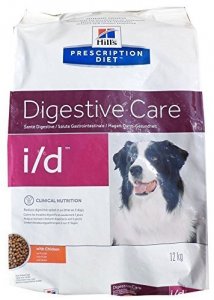
- Fat 7.8%
- Carbohydrate (NFE) 53.5%
- Fiber (raw) 1.6%
- Calcium 0.74%
- Phosphorus 0.58%
- Sodium 0.32%
- Potassium 0.87%
- Magnesium 0.09%
- Omega-3 fatty acids 0.80%
- Omega-6 fatty acids 2.03%
- Taurine 925 mg/kg
- L-carnitine 326 mg/kg
- Ginger 10,000 mg/kg
- Vitamin A 8 232 IU/kg
- Vitamin D 802 IU/kg
- Vitamin E 550 mg/kg
- Vitamin C 90 mg/kg
- Beta-carotene 1.5 mg/kg
- Protein 23.2%
Metabolic energy:
-
- kcal/100g – 335 kcal
- kJ/100g – 1 402 kJ
Royal Canin – DIGESTIVE CARE
Complete food for adult and older dogs of medium breeds (body weight from 11 to 25 kg) – Over 12 months of age – For dogs with sensitive digestive tract. Size Health Nutrition MEDIUM DIGESTIVE CARE.
Digestive system protection due to the sensitive gastrointestinal tract, the loose, intense odor may appear in dogs. MEDIUM DIGESTIVE CARE food is a precise nutritional solution supporting digestive health. Due to the content of highly digestible protein (L.I.P*.), prebiotics (FOS), and dietary fiber, food helps maintain the balance of intestinal bacterial flora and positively affects the quality of feces. Healthy skin and beautiful coat Favors, a beautiful coat and healthy skin through the content of omega-six fatty acids. A unique antioxidant complex feed helps maintain vitality through the addition of a unique complex of antioxidants that affect the protection of cells against free radicals.
Ingredients: rice, dried poultry protein, wheat flour, animal fats, wheat, corn gluten, vegetable protein isolate, barley, animal protein hydrolyzate, beet pulp, soybean oil, mineral salts, fish oil, vegetable fiber, fructooligosaccharides (0.34 %), yeast extract (source of mannooligosaccharides), borage oil, marigold extract (source of lutein).
Dietary supplements:
-
-
- Vitamin A: 21500 UI
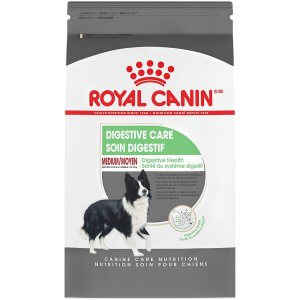
- Vitamin D3: 1000 UI
- E1 (Iron): 38 mg
- E2 (Iodine): 3.9 mg
- E4 (Copper): 12 mg
- E5 (Manganese): 50 mg
- E6 (Zinc): 150 mg
- E8 (Selenium): 0.06 mg
- Vitamin A: 21500 UI
Technological additives:
-
- Sludge-derived clinoptilolite: 10 g
- Preservatives
- Antioxidants
-
- Analytical constituents:
-
- Crude protein: 25%
- Crude oils and fats: 18%
- Crude ash: 6.2%
- Crude fiber: 1.9%
- Omega 6 fatty acids: 40.7 g / kg
-
- * L.I.P .: Protein selected for very high digestibility.
Uploria Pet World Probiotic Supplement for the Sensitive Stomach of Dogs
120 Chicken Flavored Tablets. It is also a supplement for the immune system.
A TASTE THAT WILL CONQUER YOUR DOG: Our delicious Probiotic Pro XL digestive tablets can be mixed with food or given as a prize.
PROBIOTIC SUPPLEMENTS FOR DOGS: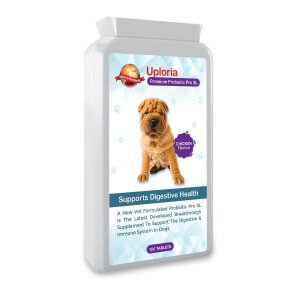
-
- Supplements for food digestion of pets
- Helps the digestive system
- Support the immune system in dogs
- Superior concentrated probiotic mixture
- Contains five strains of healthy bacteria
- Strengthens the immune system
DIGESTIVE ENZYMES FOR DOGS: By helping to reactivate the digestive system with essential healthy bacteria after taking antibiotics or steroids for dogs, probiotics provide excellent complete support for your pet’s immune system.
HIGH-QUALITY PRODUCTION: Produced according to GMP code of good practices and ISO 9001 Certification for quality assurance. Guaranteed product quality and safety are never enough when it comes to your beloved dog.
-
Conclusion
This is the logic that is used in feeding a dog with gastrointestinal problems: I reiterate, as I said at the beginning, that it is not a magic remedy, but that it serves only to support a real, medicinal therapy which is implemented by the veterinarian.
Because it is okay to feed the dog properly, but in the case of inflammation, obstruction, coccidiosis, giardiasis, parvovirus (!), Stomach twist (!!!), if the primary problem is not solved, the correct diet will be completely useless. even if formulated in the best possible way.






